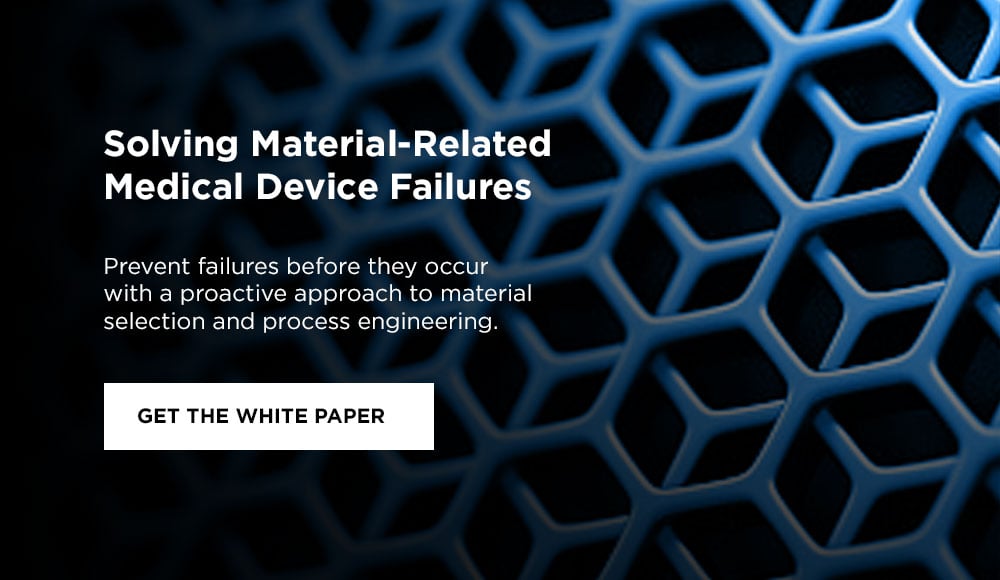Are You Asking these Questions to Prevent Material Failure in Medical Devices?

Did you know you can prevent medical device material failures before they happen?
A proactive approach to design and materials engineering can prevent costly issues throughout the medical device lifecycle and in the post market phase.
Keep reading to learn the 4 questions to ask to prevent material failure in medical devices, and download our "Materials Matter" white paper for more details.
What is A Medical Device Material Failure?
A medical device material failure is a malfunction impacting device safety or performance that can be traced back to the materials used in the design.
Material failures can happen at any point in the product life cycle and no device is immune.
Device failures can cost companies millions of dollars and lead to:
- Warranty claims
- Impacted inventory
- Damaged brand reputation
- Legal complications
- Product recalls
- Failed regulatory requirements
- Lost sales and stock devaluations
Why Materials Fail
Material failure in medical devices can have a wide range of sources. Some of the most common are:
- Poor materials selection
- Degradation during use
- Reagent or raw material stability
- Incompatibility with a manufacturing process
Failure Modes and Effects Analysis (FMEA) helps us look beyond just the materials, to the context around the design, development, manufacturing, and use.
Prevent Failures Before They Happen
The further along in the development lifecycle, the costliest these failures can become. Reengineering a device or making changes to the manufacturing process is far more expensive than making adjustments in the early design stage. Proactive design decisions early in the development process are key to resolving material failures before they happen.
Careful consideration in the materials selection process helps cut costs, control risks, and avoid unnecessary delays in the long term. The manufacturing process used should also be chosen carefully to make sure the final device meets design requirements and can withstand the intended use environment.

Avoid Material Failures With these 4 Questions
We know material failures should be prevented before they happen, but how do we get started? Ask these 4 questions early on to make sure you're making the best material selection.
1. What does the material have to do?
In-service degradation is one of the leading causes of material failure. Consider the use scenario and ask if the material is durable enough to withstand the conditions and substances it will be exposed to. Usability testing can be helpful at this stage to ensure you've chosen the right material for the job.
2. How long is the lifecycle?
How long is the device expected to function? Is your device intended to withstand a specific number of use cycles? Careful planning in the design phase helps ensure that the materials chosen for a device will last. Accelerated lifecycle prediction modeling can help to identify potential failures caused by aging and stress from use.
3. What is the environment?
Device materials can break down faster than planned in the field. High temperatures, moisture, and chemical exposure can lead to harsher environments than intended. User treatment that is rougher than expected. Medical device material testing can help to inform material selection meets the device requirements.
4. What else does it interact with?
Medical devices can also interact with other factors in the use and manufacturing environments, causing material failure. Material data sheets don't account for changes that may take place during production, like pigmentation or injection molding.
- Device materials reacting with the drug being injected
- Manufacturing processes that create unintended material issues
Take A Proactive Approach to Prevent Failures
A proactive approach to materials analysis and process engineering helps companies avoid launch delays and costly fixes, from verification and validation testing to post-launch corrections.
The most effective way to avoid device failure starts with having the right materials in place from the start. This approach involves matching the material analysis, selection, and process engineering to the context of use and the environment and lifecycle expectations.
The Battelle Advantage
Battelle works at the intersection of material science and medical device development. Our decades of research and development and state-of-the-art facilities empower our experts to address problems most labs are not equipped to handle. Our can support device development from the beginning or employ our rapid-response solutions to address critical failures in fielded devices. Find the right material solution for your medical device with our multidisciplinary, rapid-response, end-to-end approach.
Featured Expert

Erik Edwards
Principal Materials Scientist
Erik Edwards is a Principal Materials Scientist with an impressive 23 years of industry experience in research and development, including 16 years at Battelle. His expertise lies in Materials Science, with a strong focus on materials selection, process development, optimization, testing, and lifetime and failure analysis, with a significant portion of his career dedicated to medical devices materials work. Currently, Erik is focused on working with automated laboratory equipment, developing new structural materials and associated manufacturing processes for the Department of Defense, and processing of energetic materials. Erik holds a PhD in Chemical Engineering from the University of Wisconsin-Madison and a BS from Iowa State University.
Related Blogs
Sign Up for Battelle Updates
Follow along with the latest news, announcements and updates from our Battelle community of solvers.







